|
|
|
Sort Order |
|
|
|
Items / Page
|
|
|
|
|
|
|
| Srl | Item |
| 1 |
ID:
160237
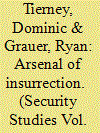

|
|
|
|
|
| Summary/Abstract |
Recent scholarship has established several key dynamics in civil wars: since the nineteenth century, rebel victories have increased in likelihood; external support is one of the most significant predictors of rebel victory; and rebel groups have become increasingly likely to receive foreign backing. What is missing is an explanation of why patterns of third-party aid to rebels changed over time. Data on foreign assistance to rebels over the last two centuries reveals the odds of groups receiving aid increased from about one in five to about four in five. The nature of the patron also altered significantly, from great powers, to lesser states, and then nonstate actors. We explain these patterns using three variables: (1) great-power competition; (2) norms of national self-determination; and (3) globalization. This paper explores this theory with a case study of aid to rebel groups in Algeria since the 1830s.
|
|
|
|
|
|
|
|
|
|
|
|
|
|
|
|
| 2 |
ID:
186090


|
|
|
|
|
| Summary/Abstract |
Under what conditions do battlefield coalitions fight as greater or less than the sum of their parts? Introducing the Belligerents in Battle dataset, which contains information on actors fighting in 492 battles during interstate wars waged between 1900 and 2003, we present, for the first time, a portrait of the universe of battlefield coalitions. Battlefield coalitions win more often and suffer fewer casualties than belligerents fighting alone. Battlefield coalitions including forces fielded by the United States, states with pre-existing treaty agreements, and democracies are particularly powerful. By contrast, battlefield coalitions that include non-state actors lose the majority of their fights.
|
|
|
|
|
|
|
|
|
|
|
|
|
|
|
|
| 3 |
ID:
157651
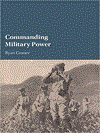

|
|
|
|
|
| Publication |
Cambridge, Cambridge University Press, 2016.
|
| Description |
xiii, 264p.: figurespbk
|
| Standard Number |
9781316611722
|
|
|
|
|
|
|
|
|
|
|
|
Copies: C:1/I:0,R:0,Q:0
Circulation
| Accession# | Call# | Current Location | Status | Policy | Location |
| 059316 | 951.904/GRA 059316 | Main | On Shelf | General | |
|
|
|
|
| 4 |
ID:
138426
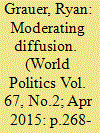

|
|
|
|
|
| Summary/Abstract |
How do military ideas, and military doctrines in particular, spread through the international system? This article extends extant work on military diffusion by exploring why some states, after deciding to adopt another's innovative warfighting system, fail to implement it. The author argues that for states to successfully implement a military doctrine developed abroad, much information about the unobservable aspects of the warfighting system is needed. States vary in their capacity to acquire the necessary knowledge because they face differing levels of resistance to military diffusion within their armed forces. Powerful groups within the military that are opposed to such adoptions are likely to use their influence to press for policies and bureaucratic maneuvers that constrain information flows between innovating states and their own state and consequently inhibit implementation and diffusion of military doctrines. Therefore successful implementation of foreign military doctrines can be expected when states face minimal resistance within their militaries, and moderated or failed implementation can be expected when opposition is more significant. A provisional test of the argument is conducted through an assessment of Argentina, Brazil, and Chile's attempts to implement the German military doctrine at the turn of the twentieth century.
|
|
|
|
|
|
|
|
|
|
|
|
|
|
|
|
| 5 |
ID:
152708
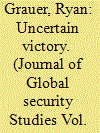

|
|
|
|
|
| Summary/Abstract |
War, as Clausewitz reminds us, is fought in the domain of uncertainty. Human nature, friction, and chance combine to create a fog that shrouds both friendly and enemy activities. Accordingly, effective warfighting is as much a product of information gathering and processing as deliverance of kinetic energy. Existing theories of military power, however, privilege the latter over the former. This paper seeks to address this imbalance and push forward scholarly understandings of martial capability by advancing a new framework for thinking about the way in which militaries’ capacities to manage uncertainty condition their abilities to generate combat power. The manner in which militaries organize their command and control structures is identified as a key factor in the management of uncertainty, and its role in facilitating both information management and the generation of martial strength is theorized. The command structure theory advanced is provisionally assessed through an examination of a key battle in the Russo-Japanese War—an engagement that Japan won but, by all conventional measures of military power, it should have lost. The paper concludes with a discussion of open questions raised by the claim as well as scholarly and policy implications.
|
|
|
|
|
|
|
|
|
|
|
|
|
|
|
|
| 6 |
ID:
111587


|
|
|
|
|
| Publication |
2012.
|
| Summary/Abstract |
This paper assesses the relative importance of force employment as a cause of military victory. It focuses on the adoption of the modern system in interstate wars since 1917. Using cases, contingency tables, and regression analysis, we find that war participants who use the modern system are significantly more likely to succeed in decisive battlefield engagements. However, the modern system does not predict victory at a higher rate than more traditional unit-level explanations for combat effectiveness, suggesting that it might function as a causal mechanism linking factors like regime type and material endowments with martial capabilities. Exploring the possible links between unit-level explanations of military power and the organizational-level force employment indicators, we find that more materially powerful states and democracies tend to implement the modern system at a higher rate than other types of actors, but more extreme autocracies also frequently adopt. Combined, these findings suggest the relevance of continuing to explore how organizational-level variables impact military effectiveness.
|
|
|
|
|
|
|
|
|
|
|
|
|
|
|
|
| 7 |
ID:
134009
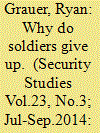

|
|
|
|
|
| Publication |
2014.
|
| Summary/Abstract |
Surrender, or capitulation to the adversary in combat, can have a significant impact on the duration, intensity, and outcomes of battles and wars. Yet the reasons why soldiers choose to capitulate are not well understood. This article advances a new theory of surrender that argues soldiers are most likely to surrender when they perceive proximate environmental signals leading them to expect humane treatment and a relatively short period of captivity and least likely to give up when those signals lead them to expect abusive treatment and lengthy imprisonment. The model is tested through a detailed examination of surrender rates in World War I and findings indicate that it explains more of the observed variation than do existing theories of capitulation. What little systematic data exists on surrenders during twentieth century interstate wars corroborates these findings. Implications for scholars and policymakers are briefly considered.
|
|
|
|
|
|
|
|
|
|
|
|
|
|
|
|
|
|
|
|
|